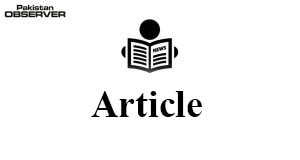Paradigm shift in Pak-Russia relations
IN the last two decades, the attitude of the developed nations, especially in bilateral relations, has undergone such dramatic changes that they could not have been imagined some time ago.
Relationships based on hostility and confrontation have turned into relationships of friendship and cooperation.
Countries that once had strictly closed their borders to neighbouring states are now not only having good trade relations but also having cultural exchanges and economic cooperation between them.
How was this transformation possible in the world politics? The reason behind the conflicts was artificial system devised by the great powers to keep nations away from each other, which they imposed on the world, strictly unnaturally, on the basis of “ideology”.
The system was called the Cold War, in which the (former) Soviet Union and the US, the two great powers that conquered Germany and Japan in the World War-II, divided the world.
With this division, the two countries became “superpowers”, while nearly 200 other countries of the world remained mired in poverty and backwardness.
However, the unexpected collapse of the “Berlin Wall” in 1989 ushered in a series of political upheavals in Europe that eventually led to the disintegration of the Soviet Union and the end of the “Cold War”.
While the end of the Cold War forced almost all countries of the world to make necessary changes in their foreign and defence policies, the Soviet Union and present-day Russia also had to reconsider its relations with the outside world, especially with its neighbours.
The environment, which has been created internationally since the end of the Cold War, has certainly played a significant role in the growing cooperation between Pakistan and Russia in various fields.
During the “Cold War”, close and friendly relations between Pakistan and Soviet Union did not develop because both of these countries were in opposite camps.
As India was closed ally of Russia at that time but as usual India’s friendship is limited to its personal gains so, she changed her focused (arms deal) from Russia to US and Russia got free to develop its relations with any country it want.
As in recent years, both countries have made efforts to bury their bitter past and open a new chapter in bilateral ties.
To strengthen strategic ties of Pakistan-Russia, Joint Military Consultative Committee was established in 2018 to support Pakistan-Russia bilateral military cooperation.
Russian warships participated in the 45-nation AMAN-21 Biennial Naval exercises hosted by Pakistan in Arabian Sea in February 2021.
In November 2020, Russian Special Operations troops held joint drills with their Pakistani counterparts in the Friendship 2020 exercises at the Tarbela training ground KP.
Moreover, US President Donald Trump ended Pakistan’s participation in its international military education programme. Pakistan signed a security training agreement with Moscow for training of military officers in Russia.
Whereas, the recent visit of Pakistan NSA, Moeed Yusuf to Moscow, will further pave the way in strengthening their relations as Pakistan and Russia have shared a similar view on Afghanistan, both countries have sought engagement with the Taliban government.
They also urged the United States to unfreeze $9.5 billion assets of the Afghan Central Bank.
However, Washington is using Afghan foreign assets as leverage over the Taliban to make them meet international expectations.
Both Russia and Pakistan are worried that the economic collapse of Afghanistan may allow terrorist groups to gain a foothold in Afghanistan. Russia is particularly concerned over the threat posed by Daesh in Afghanistan.
The visit of Moeed Yusuf was part of increased exchanges between the two countries in view of the changing regional situation. Russia is close to signing a deal with Pakistan to lay a gas pipeline from Karachi to Lahore.
Similarly, Russia, which has remained a strong ally and arms supplier of India, is also keen to deepen defence ties with Pakistan.
Interestingly, Moeed’s visit comes just days before Russian President Vladimir Putin is due to visit India and the timing of his visit suggests that Putin’s visit may also come up in the discussions.
In April 2021, Russian Foreign Minister Sergey Lavrov visited Islamabad and conveyed a message from President Putin that Russia was ready to extend all possible help to Pakistan and agreed to remain engaged on all matters of mutual importance.
After sketching the whole picture, with concluding remarks, I would say that Pakistan has a significant role in the emerging geopolitical chessboard in Eurasia owing to its geopolitical location, strong military with advancing nuclear capability and considerable influence in the Islamic world.
As far as westward connectivity is concerned, CPEC is one of the key future gateways which would help Pakistan to join CARs, Russia and Eurasia to our warm waters.
—The writer is contributing columnist.










